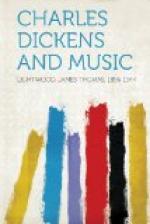there was not a man or boy
in all the village and
away to the turnpike (tollman
included) but would have
blown away for him till he
was black in the face.
What a delight it must have been to him to avail himself of the opportunity to play the organ in the cathedral when he went to meet Martin!
As the grand tones resounded through the church they seemed, to Tom, to find an echo in the depth of every ancient tomb, no less than in the deep mystery of his own heart.
And he would have gone on playing till midnight ’but for a very earthy verger,’ who insisted on locking up the cathedral and turning him out.
On one occasion, while he was practising at the church, the miserable Pecksniff entered the building and, hiding behind a pew, heard the conversation between Tom and Mary that led to the former being dismissed from the architect’s office, so he had to leave his beloved organ, and mightily did the poor fellow miss it when he went to London! Being an early riser, he had been accustomed to practise every morning, and now he was reduced to taking long walks about London, a poor substitute indeed!
Nor was the organ the only instrument that he could play, for we read how he would spend half his nights poring over the ’jingling anatomy of that inscrutable old harpsichord in the back parlour,’ and amongst the household treasures that he took to London were his music and an old fiddle.
The picture which forms our frontispiece shows Tom Pinch playing his favourite instrument. At the sale of the original drawings executed by ‘Phiz’ for Martin Chuzzlewit this frontispiece, which is an epitome of the salient characters and scenes in the novel, was sold for L35.
We read in Christmas Stories that
Silas Jorgan
Played the organ,
but we are not told the name of the artist who at the concert at the Eagle (S.B.C. 4) accompanied a comic song on the organ—and such an organ!
Miss J’mima Ivins’s
friend’s young man whispered it
had cost ‘four hundred
pound,’ which Mr. Samuel Wilkins
said was ‘not dear neither.’
The singer was probably either Howell or Glindon. Dickens appears to have visited the Eagle Tavern in 1835 or 1836. It was then a notable place of entertainment consisting of gardens with an orchestra, and the ‘Grecian Saloon,’ which was furnished with an organ and a ‘self-acting piano.’ Here concerts were given every evening, which in Lent took a sacred turn, and consisted of selections from Handel and Mozart. In 1837 the organ was removed, and a new one erected by Parsons.
The Eagle gained a wide reputation through its being introduced into a once popular song.
Up and down the City Road,
In and out the
Eagle,
That’s the way the money
goes,
Pop goes the weasel.
This verse was subsequently modified (for nursery purposes) thus:




